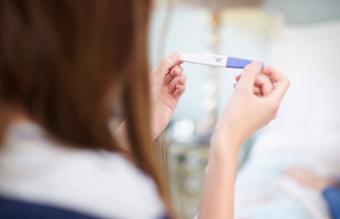
A home pregnancy test (HPT) measures the level of human chorionic gonadotropin (HCG) in your urine. This pregnancy hormone is secreted shortly after implantation by the cells of the early placenta. Under laboratory conditions, the urine HPT is claimed to be least 99 percent accurate, according to the Office on Women's Health. However, the test is less accurate in users' hands because of errors in following instructions, a defective test kit, or other factors.
False Positives and False Negatives
When discussing the accuracy of your home pregnancy test, it's important to understand the difference between a false positive and a false negative result.
- A false positive result wrongly suggests that you are pregnant when conception has not actually occurred. False positives are more often caused by a chemical pregnancy, or factors in your urine, such as blood, that interfere with test, or fertility HCG medications you excreted in your urine.
- A false negative result would suggest that you are not pregnant when you really are. Generally, false negative results are more common than false positive results. Most false negative results are caused by user error, a too dilute urine, or doing the test too soon.
According to a review in the Global Library of Women's Medicine there is a ten percent false negative rate for home pregnancy tests and the same for the false positive rate. A study published in the American Journal of Public Health showed a higher false negative rate of around 24 percent.
Accuracy and Test Sensitivity
If you're concerned about the results of your home pregnancy, make sure you buy a test that has a higher sensitivity to detect HCG early in your pregnancy. Get a kit that is sensitive to detect at least a HCG level as low as 20 milli-international units per milliliter (mIU/ml). For comparison, blood pregnancy tests can detect a HCG level of five mIU/ml or lower and therefore are more accurate than the urine HPT in the early days of pregnancy.
A sensitive urine HCG test allows for early detection of your pregnancy, possibly as soon as eight days after fertilization of your egg and conception. It's important to remember that you time when you should do your first test based on the day you estimated you ovulated, not based on when you had intercourse.
The Results Are More Reliable if You Wait
Implantation can occur late in the menstrual cycle from ovulation for some women according to a study in the New England Journal of Medicine. Therefore, the reliability of your urine HPT results improves if you wait to do your testing.
According to the Handbook of Clinical Laboratory Testing During Pregnancy (page 29), the accuracy of HPTs based on when you do the test is as follows:
- Before the day of the expected next period: less than 90 percent
- On the day of the expected period: 90 percent
- One week after the day of the missed period: 97 percent
The handbook points out that, despite the more than 99 percent accuracy the manufacturers claim, variables such the HCG standard reference solutions against which they measure their tests can be unreliable. Furthermore, test accuracy can vary widely between products.
Tips for Improving Accuracy of the Test
The following tips will help with accuracy as you're performing your test:
- Wait until your period is at least one week late, particularly if you've had irregular menstrual cycles in the past. Testing on the first day of your missed period results in pregnancy test accuracy rates of about 80%.
- Store your test at the proper temperature and never leave it in a hot car. Extreme heat or cold can damage your home pregnancy test.
- Follow the test's timing instructions. Waiting too long to read the results or reading the results before the specified time period has passed can cause a false positive or false negative result.
- Make sure the control window that indicates the test is not dysfunctional shows a positive.
- Take the test right away in the morning when the pregnancy hormone levels in your urine should be the highest.
- Don't consume large amounts of fluids including water coffee, soda, or other beverages before the test. This can dilute your urine and lower the concentration of HCG and make it harder to detect.
- If you don't understand how to take your home pregnancy test, call the customer service number listed in the instruction pamphlet for further assistance.
- Never use a test that has passed its expiration date.
Talk to Your Doctor if You Are Concerned
Home pregnancy tests are convenient and give quick results in private. They are more accurate in detecting HCG in your urine if you don't do the test too early and you follow all the instructions and precautions that come with the product. Contact your doctor if have concerns or questions about your results.







